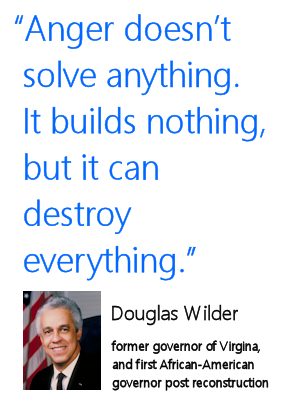Anger creates distance in relationships. It pushes people away from us.
 I once made the mistake of living with my best friend in college. Remember what happens when you live with your best friend in college? You wind up not being best friends anymore – which is exactly what happened to us. However, I remember at the end of that year, looking at my roommate, and thinking there will come a time when we won’t remember who emptied the dishwasher last, or who left the milk out. All we will remember is that we fought, and that we are no longer best friends because of it. A similar thing happens when families fall apart. It is all too common that people don’t even recall what was so important that they needed to fight about it. But the fighting? They always remember the fighting.
I once made the mistake of living with my best friend in college. Remember what happens when you live with your best friend in college? You wind up not being best friends anymore – which is exactly what happened to us. However, I remember at the end of that year, looking at my roommate, and thinking there will come a time when we won’t remember who emptied the dishwasher last, or who left the milk out. All we will remember is that we fought, and that we are no longer best friends because of it. A similar thing happens when families fall apart. It is all too common that people don’t even recall what was so important that they needed to fight about it. But the fighting? They always remember the fighting.
Anger does have a practical function. Like touching a hot stove, pain warns us that we’re in danger and that something has the potential to harm us, and we need to take action before serious damage occurs. Anger is very similar and is a protective response for our emotional state.
 However, anger is such a powerful emotion that it often masks deeper feelings of sadness, fear, grief, guilt, embarrassment, or lack of control. Anger feels powerful and strong, so it is a lot easier and seemingly straight forward, to give in to anger instead of confronting those more vulnerable feelings. One of the problems is that anger can be counterproductive. Our anger will push other people away, and we’ll find ourselves alone with our feelings of sadness or fear. These are feelings that often fester and worsen when we feel isolated.
However, anger is such a powerful emotion that it often masks deeper feelings of sadness, fear, grief, guilt, embarrassment, or lack of control. Anger feels powerful and strong, so it is a lot easier and seemingly straight forward, to give in to anger instead of confronting those more vulnerable feelings. One of the problems is that anger can be counterproductive. Our anger will push other people away, and we’ll find ourselves alone with our feelings of sadness or fear. These are feelings that often fester and worsen when we feel isolated.
Aggression, screaming, yelling, or conversely, holding back your anger and talking about it, are all learned strategies in dealing with anger. Your response and how you react is something you can learn to manage, but it may be difficult. Becoming angry can be a tough habit to change in part because we resort to tactics that have worked for us in the past. Getting really mad may seem to get us what we want, but like bullying, it alienates and extracts a terrible costs on our relationships over time.
So then, why do people ever yell? The urge is certainly understandable and we all seem to give in to it at some point, regardless of how illogical it is. If someone doesn’t agree with me, or understand me, is repeating the same thing over and over again – only louder – going to help? Increasing your volume does not make you more persuasive. However, it can make family members fear someone enough to hide their true thoughts, and then the ensuing anger creates distance between them as family members begin to lie about their true thoughts and feelings.
Creating Fear – Yelling can cause other people to fear you enough to comply with your request. The yeller is trying to assert their power and control the other person. If they become scared enough, they will lie and pretend to agree with the yeller, while sowing contempt and resentment into the relationship.
Loss of Control indicator – The person yelling is out of control, literally. Few people like that feeling. Rather, we resort to yelling when we feel cornered, as though we have no other options. When we have lost our ability to think creatively and identify a better choice, we crank up the volume. So, when I feel like yelling, that is an excellent time to stop and ask myself, what are my choices here? With children, we can then turn to creating logical consequences, so that the child learns rather than just being intimidated by fear. With adults, we can make our own choices, and then must respect the rights of others to make their own decisions.

It can be difficult and may feel unnatural, but if we can let our guard down long enough to share our more vulnerable feelings (fear, sadness, helplessness, etc.), we can instead draw family members closer to us. Understanding and empathy begin to flow and relationships are strengthened. But the vulnerability of those deeper feelings can be hard for us to face. When learning any new language, it’s helpful to have an instructor who is fluent, to practice as much as possible, and to acknowledge and analyze your mistakes. This is just as true when learning the language of feelings.
Here’s where an experienced educator (your therapist) can help. Family members can learn communication styles that create intimacy instead of distance, while promoting understanding and compassion. Sometimes it helps to figure out the root of one’s anger, but often more importantly, people can figure out how to master their emotions, instead of the emotions controlling them.
Lisa Elieson, MA, LPC-S
© Hidden Lakes Counseling